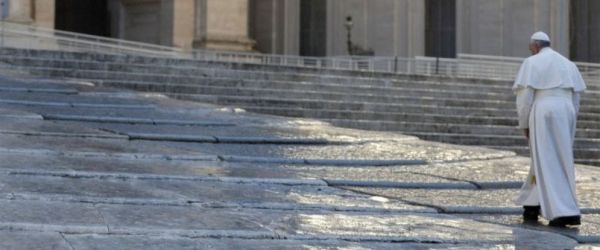"Times change, and we Christians must continually change." Pope Francis repeated this invitation to change several times during the Mass celebrated Friday morning, Oct. 23, in the chapel of Casa Santa Marta. An invitation to act "without fear" and "with freedom," keeping away from tranquilizing conformisms and remaining "firm in faith in Jesus" and "in the truth of the Gospel," but moving "continually according to the signs of the times."
The cue for reflection was offered to the Pontiff by the readings of this last part of the liturgical year, which offer in particular the letter to the Romans. "We emphasized," he recalled in this regard, "how Paul preaches so powerfully, the freedom that we have in Christ. It is, the Pope explained, "a gift, the gift of freedom, that freedom that saved us from sin, that made us free, children of God like Jesus; that freedom that leads us to call God Father." So Francis added that "to have this freedom we must open ourselves to the power of the Spirit and understand well what is happening within us and outside of us." And if in "the past few days, last week," there had been a focus on "how to distinguish what happens within us: what comes from the good Spirit or what does not come from him," that is, on discerning what "happens within us," in the day's liturgy the Gospel passage from Luke (12:54-59) exhorts us to "look outside," making us "reflect on how we evaluate the things that happen outside of us."
Here then is the need to question "how we judge: are we capable of judging?" For the Pope, "we have the capacity" and Paul himself "tells us that we will judge the world: we Christians will judge the world." The apostle Peter also says something similar when he "calls us a chosen race, a holy priesthood, a nation chosen precisely for holiness."
In short, the pontiff clarified, we Christians "have this freedom to judge what happens outside of us." But, he warned, "in order to judge we must know well what is happening outside of us." And so, Francis wondered, "how can we do this, which the Church calls 'knowing the signs of the times'?"
In this regard, the Pope noted that "times change. It is proper Christian wisdom to know these changes, to know the different times and to know the signs of the times. What means one thing and what another." Of course, the Pope is aware that this "is not easy. Because we hear so many comments, 'I heard that what happened there is this or what happens there is the other; I read this, I was told this...'" However, he quickly added, "I am free, I have to make my own judgment and understand what it all means." Whereas "this is a job that we don't usually do: we conform, we reassure ourselves with 'I've been told; I've heard; people say; I've read...'. And so we are quiet." When instead we should ask ourselves, "What is the truth? What is the message the Lord wants to give me with that sign of the times?"
As usual, the Pope also offered practical suggestions "for understanding the signs of the times." First of all, he said, "silence is necessary: be silent and watch, observe. And afterwards to reflect within ourselves. An example: why are there so many wars now? Why did something happen? And to pray." So "silence, reflection and prayer. Only in this way can we understand the signs of the times, what Jesus wants to tell us."
And in this sense there are no alibis. Although in fact each of us may be tempted to say, "But, I didn't study that much.... I didn't go to college or even middle school...," Jesus' words leave no room for doubt. For he does not say, "Look at how university students do it, look at how doctors do it, look at how intellectuals do it...." On the contrary, he says, "Look to the peasants, to the simple: they, in their simplicity, know when the rain comes, how the grass grows; they know how to distinguish the wheat from the weeds." Consequently, "that simplicity - if it is accompanied by silence, reflection and prayer - will make us understand the signs of the times." Because, he reiterated, "times change and we Christians must change continually. We must change steadfast in our faith in Jesus Christ, steadfast in the truth of the Gospel, but our attitude must continually move according to the signs of the times."
At the end of his reflection, the pontiff returned to his initial thoughts. "We are free," he said, "because of the gift of freedom that Jesus Christ has given us. But our work is to examine what happens within us, to discern our feelings, our thoughts; and to analyze what happens outside of us, to discern the signs of the times." How? "With silence, with reflection and with prayer," he repeated at the conclusion of his homily.
[Pope Francis, s. Marta, in L'Osservatore Romano 24/10/2015]












